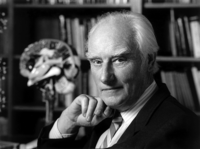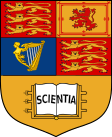Francis Crick Institute
 | |
| Founded | 2010 |
|---|---|
| Type | Charitable organization |
| Registration no. | England and Wales: 1140062 |
| Focus | Medical research |
| Location |
|
| Origins | Founded in 2010 |
Area served | Europe |
| Website | www |
The Francis Crick Institute is a planned biomedical research centre to be located from 2015 in London, United Kingdom.[1] The Francis Crick Institute is a partnership between Cancer Research UK, Imperial College London, King's College London, the Medical Research Council, University College London (UCL) and the Wellcome Trust.[2] It will be the biggest centre for biomedical research and innovation in Europe.[1] The Francis Crick Institute Limited is a registered charity in England and Wales no. 1140062 and a company registered in England and Wales no. 06885462, with its registered office at 215 Euston Road, London NW1 2BE.
The Francis Crick Institute, (formerly the UK Centre for Medical Research and Innovation) will be located in a new state-of-the-art 79,000 square metres building to be built next to St Pancras International railway station in the Camden area of Central London.[3] Construction began in July 2011, with researchers expected to be able to start work in 2015.[3] Construction and fit-out of the building is budgeted at approximately £600 million.[3]
Once up and running the Francis Crick Institute is planned to have 1,500 staff, including 1,250 scientists, and an annual budget of over £100 million.[3] It is named after British molecular biologist, biophysicist, and neuroscientist Francis Crick, co-discoverer of the structure of DNA, who shared the 1962 Nobel Prize for Physiology and Medicine with James Watson and Maurice Wilkins.
History

In February 2005 it was announced that the Medical Research Council's National Institute for Medical Research would relocate to UCL.[4] The creation of the UK Centre for Medical Research and Innovation (UKCMRI) was announced by the Prime Minister, the Rt. Hon. Gordon Brown MP, on 5 December 2007.[5][6]
It was announced on 15 July 2010 that Nobel laureate Sir Paul Nurse would be the first Director and Chief Executive of the UKCMRI.[7] He took up his post on 1 January 2011.[8]
On 20 October 2010 the Chancellor of the Exchequer George Osborne confirmed that the British Government would be contributing £200 million towards the capital cost of the Centre.[9][10] On 11 November 2010 Cancer Research UK, the Medical Research Council, UCL and the Wellcome Trust signed an agreement to establish the UKCMRI as a charitable foundation, subject to the agreement of the Charity Commission.[11]
On 15 April 2011 it was announced that Imperial College London and King's College London would be joining the UKCMRI as partners and had both signed a memorandum of understanding to commit £40 million each to the project.[2] On 25 May 2011 it was announced that the UKCMRI would be renamed the Francis Crick Institute in July to coincide with ground being broken on the construction of its building, in honour of the British scientist Francis Crick.[12] Laing O'Rourke are carrying out the construction work.[13]
In July 2011 the UK Centre for Medical Research and Innovation was renamed the Francis Crick Institute,[12]. The Francis Crick Institute is a registered charity in England and Wales no. 1140062 and a company registered in England and Wales no.06885462, with its registered office at 215 Euston Road, London NW1 2BE.
A dedication ceremony for the new building was held on 11 October 2011, attended by Mayor of London Boris Johnson, David Willetts MP and Sir Paul Nurse. Francis Crick's surviving daughter Gabrielle (by his second marriage) gave a short speech while his son Mike (by his first marriage) donated Crick's California licence plate "AT GC" into a time capsule buried during the ceremony.[14]
Participants
The participants in the Francis Crick Institute, and their committed financial contributions to capital costs, are as follows:[2]
- Cancer Research UK - £160 million
- Imperial College London - £40 million
- King's College London - £40 million
- Medical Research Council - £300 million
- UCL (University College London) - £40 million
- Wellcome Trust - £120 million
See also
References
- ^ a b Jha, Alok (19 June 2010). "Plans for largest biomedical research facility in Europe unveiled". London: The Guardian. Retrieved 11 August 2010.
- ^ a b c "Three's company: Imperial, King's join UCL in £700m medical project". Times Higher Education. 15 April 2011. Retrieved 16 April 2011.
- ^ a b c d "Project Press Release". UK Centre for Medical Research and Innovation web site. 21 June 2010. Retrieved 11 August 2010.
- ^ "UCL wins lucrative research contract". The Guardian. 11 February 2005. Retrieved 23 October 2010.
- ^ "Deal secures £500m medical centre". BBC News. 5 December 2007. Retrieved 23 October 2010.
- ^ "London to lead in medical research". The Telegraph. 5 December 2007. Retrieved 23 October 2010.
- ^ "Project Press Release". UK Centre for Medical Research and Innovation web site. 15 July 2010. Retrieved 11 August 2010.
- ^ "Sir Paul Nurse: Nobel prize-winner Britain's 'most important' scientist". The Telegraph. 7 October 2010. Retrieved 23 October 2010.
- ^ "Spending Review: Science budget escapes swingeing cuts". The Telegraph. 20 October 2010. Retrieved 23 October 2010.
- ^ "Q&A: Science in the Spending Review". BBC News. 20 October 2010. Retrieved 23 October 2010.
- ^ "Green light for £600m medical research centre in London". Construction News. 11 November 2010. Retrieved 11 November 2010.
- ^ a b "A new name for UKCMRI". UK Centre for Medical Research and Innovation web site. Retrieved 25 May 2011.
- ^ O’Rourke wins prized £350m superlab contract Construction Enquirer, 2 March 2011
- ^ e-mail from Mike Crick to Martin Packer 25 October 2011



